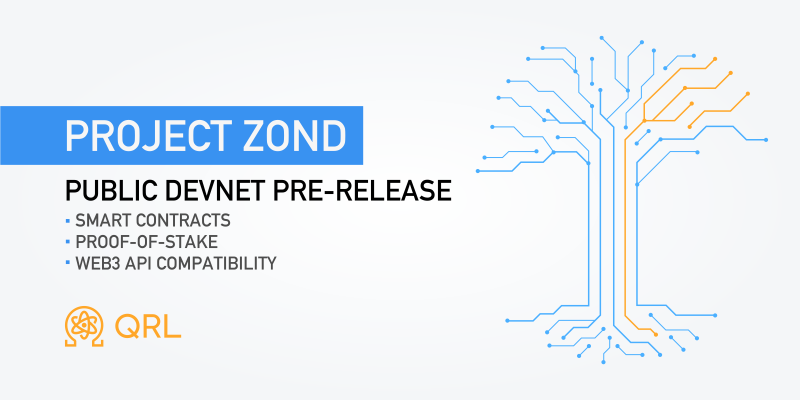Introducing a powerful post-quantum safe public devnet pre-release with Ethereum Web3 ecosystem compatibility

technical proof-of-stake smart-contracts
16th September 2022
Table of Contents
We’re happy to release the Zond Public Devnet pre-release for our upcoming QRL Hackathon 2022!
Anyone can run their own Proof-of-Stake node connected to the devnet network, stake, create smart contracts and interact with them.
With the QRL Hackathon 2022 approaching, the Public Devnet of the next iteration of QRL, codenamed Zond, will be revealed. This represents the result of years of iterative research and development to provide efficient post-quantum and Ethereum-compatible Proof-of-Stake and smart contracts to the QRL environment, which can be implemented with small modifications into the majority of web3 ecosystems.
Getting started
Disclaimer: This is a an early pre-release of a devnet. Expect scattered documentation, bugs, frequent devnet resets, and more.
Over the last week, the team has been hard at work documenting, breaking, and refining Zond.
For those coming from the previous codebase:
- Although Zond still uses XMSS, it’s a completely rewritten codebase written in golang vs python before. At the moment, it’s best to look at the API layers from QRL v4 as deprecated to be replaced with web3 protocols and tooling (with some slight modifications).
- The addresses are different. For better Ethereum compatibility, we’ve adjusted the address structure to match. Rather than starting with a Q with 79 characters, it starts with a 0x and (42 characters)
- Performance is noticable. Everything from installing to performing functions, happens quickly, and as a bonus, with little hassle (unless something breaks - devnet after all!). Getting a node up and running can be done (including downloading a devnet boostrap file) in under 20 seconds on a modest connection!
Quick references
- Documentation: https://zond-docs.theqrl.org/
- Web3 smart contract example: https://github.com/theQRL/zond-contract-example
- Public API Address/Port: 45.76.43.83:19009
- RPC API Address/Port: 45.76.43.83:4545
1. Run a node
For the latest, you’ll want to head over to the Zond docs node installation instructions: https://zond-docs.theqrl.org/node/node-installation
Installation currently consists of pulling from the main zond repo (https://github.com/theQRL/zond), downloading a zond-boostrap.zip file, applying it to various places, modifying a peerList in a config file, compiling, and running the node. The main prerequisite will be golang, of course.
This is mostly automated with zond-init, which is an unofficial init script that does the above steps.
2. Create an address
As mentioned, the address format is different, and you can create two different address types, XMSS, and Dilithium, which have identifications in the first byte.
| Address | Identification Byte | Type |
|---|---|---|
| 0x1005003ea6ed78d597e7411a8ddbc2dffd8839e5 | 0x10... | XMSS Address |
| 0x20bf1acdae054f4194e0c132b489e8f9099caf8c | 0x20... | Dilithium Address |
More can be found in our documentation.
Right now, people can use a Dilithium or XMSS Address to transfer or deploy contract or to interact with contract. Staking can only be done with Dilithium at this point, so that’s what we’re going to use.
In the zond directory (~/zond/), you’ll have zond-cli, which you can use to create your address.
| |
This will spit out your Dilithium address and create an unencrypted entry in a wallet.json file from the location the script is run. You can list your addresses with ./zond-cli wallet list.
Get some testnet QRL
You’ll want send a message in Discord with your testnet Dilithium key, who should give you enough testnet QRL to stake and a little to play with. A faucet is coming to help facilitate this.
Send some testnet QRL!
You’ll want to replace the --to address with the address you’re sending to and nonce for every transaction you send. If you want to use your local node, replace the endpoint of --remote-addr with 127.0.0.1:19009
| |
3. Stake your QRL
A minimum of 10000 QRL will be required to stake, which you should have received from someone in Discord. If you haven’t already, be sure to go there and request some!
In order to stake, you’ll need to:
- Generate a set of dilithium public keys from your Dilithium address, where each public key corresponds to 10,000 QRL.
- Send a stake transaction from the dilithium address you’re staking from.
- Move a dilithium_keys file to ~/.zond/dilithium_keys
- Restart your node.
- Wait for the next epoch (every 100 blocks).
Staking works with some similarity to how it did before, though key differences will be outlined more later through the docs and hackathon.
Expanded instructions
The first two steps are taken care of for you in a single command
| |
After that you’ll need to move the dilithium_keys file to ~/.zond/
| |
Then, quit your node with ctrl+c and start it again with ./gzond
To unstake, you’ll want to send a stake transaction with a 0 amount.
| |
4. Creating QRVM smart contracts
Zond comes with EVM smart contract compatibility known as the Quantum Resistant Virtual Machine (QRVM), so any smart contract you’ve created before should work on the Zond devnet pre-release, but with extra security and longevity built in!
For a guide, you’ll want to follow through the web3 smart contract example: https://github.com/theQRL/zond-contract-example
5. Zond Node API’s
If you’ve ever interacted with Ethereum, you’ll be right at home using our Node APIs.
This is outlined in our Zond documentation with more frequently being added.
Included so far are:
- zond_blockNumber
- zond_sendRawTransaction
- zond_getBalance
- zond_getStorageAt
- zond_getCode
- zond_call
- zond_getBlockTransactionCountByHash
- zond_getBlockTransactionCountByNumber
- zond_getBlockByHash
- zond_getBlockByNumber
- zond_getTransactionByBlockHashAndIndex
- zond_getTransactionByBlockNumberAndIndex
These can be called by curl or any language that can do a post request:
| |
Stuck? Looking for more?
Be sure to join our Discord or join us at our QRL Hackathon 2022 in a few days in Amsterdam!
Proof of Stake smart-contracts technical
16th September 2022
